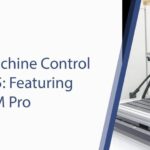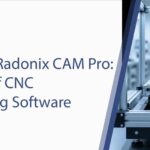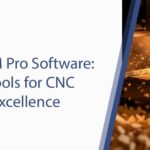CNC Controller Systems Classification
CNC (Computer Numerical Control) technology is the backbone of modern manufacturing processes, enabling high precision, repeatability, and efficiency through the automated control of machine tools. The CNC controller is the central component of this technology, directly influencing the performance and quality of the machining operations. Therefore, understanding the technical specifications and capabilities of different CNC control systems is essential for making informed decisions regarding industrial applications.

1. PC-Based CNC Controller Systems:
PC-based CNC systems are driven by software running on a personal computer (PC), offering flexibility, scalability, and powerful processing capabilities. These systems are highly customizable, enabling users to adjust control parameters and integrate advanced functions. They are ideal for applications that demand a high level of precision and versatility. Below are examples of key systems:
Radonix PC Smart 6A:
- Positioning: Mid-range system, offering an excellent balance of performance and cost.
- Control Capability: Supports up to 6 axes of simultaneous control.
- Target Users: Small to medium enterprises (SMEs) and industrial applications requiring flexible control solutions.
- Features: Ethernet communication, optocoupler isolation for protection, and customizable programming options.
- Applications: Suitable for various industries, including light manufacturing and small-scale production, where cost-effective, flexible control is needed.
Texcomputer (TNC 640):
- Positioning: High-precision, high-end system designed for advanced manufacturing needs.
- Control Capability: Closed-loop control for enhanced accuracy, with advanced interpolation algorithms.
- Target Users: Industries requiring high precision, such as aerospace, medical, and tooling sectors.
- Features: iHMI (intelligent human-machine interface), advanced motion control algorithms, and real-time feedback for precise machining.
- Applications: Ideal for complex machining tasks like aerospace components, medical devices, and precision tooling.
Mach3 and Mach4:
- Positioning: Popular, cost-effective systems used for a wide range of applications from hobbyists to small workshops.
- Control Capability: Open-loop control, suitable for less demanding applications where high precision is not critical.
- Target Users: Hobbyists, prototyping, and small workshops.
- Features: Mach4 offers more advanced features than Mach3, including higher resolution control, faster processing speed, and support for external devices.
- Applications: Suitable for hobby machines, small-scale production, and research/development setups.
Syntec 6MB Series:
- Positioning: Mid-range system designed for industrial applications.
- Control Capability: Supports EtherCAT and Ethernet communication, with real-time control for dynamic operations.
- Target Users: Automotive, aerospace, and general industrial sectors.
- Features: Dynamic compensation, multi-axis control, and enhanced communication protocols for high-speed operations.
- Applications: Used in high-speed cutting, machining, and other industrial processes requiring precise motion control.
Milteksan HSC and Fagor 8065:
- Positioning: High-end systems with closed-loop control, designed for complex and high-performance applications.
- Control Capability: High-speed cutting, dynamic compensation, and advanced feedback mechanisms.
- Target Users: Heavy industries, precision machining, and high-speed cutting environments.
- Features: Enhanced safety features, real-time feedback, and advanced error compensation for precise control.
- Applications: Used in high-speed cutting, tool-making, and demanding industrial applications requiring precision and reliability.
HNC-848 Series (HuazhongCNC):
- Positioning: High-capacity system designed for large-scale industrial applications.
- Control Capability: Supports up to 32 axes for complex machines.
- Target Users: Large-scale industrial manufacturers and organizations with complex machining requirements.
- Features: Advanced motion control, multi-axis synchronization, and high processing power.
- Applications: Ideal for large-scale machinery, including multi-axis CNC mills, lathes, and complex industrial equipment.
| Feature | Radonix PC Smart 6A | Texcomputer (TNC 640) | Mach3 | Syntec 6MB Series | Milteksan HSC | Fagor 8065 | HNC-848 Series (HuazhongCNC) |
| Axes | 6 (expandable) | 6 (expandable) | 6 (expandable) | 4 (expandable) | 5 (expandable) | 6 (expandable) | 5-32 axes (expandable) |
| Digital Inputs | 24 (PNP/NPN) | 24 (PNP/NPN) | Not specified | 16 | 16 | 32 | 48 (PNP/NPN support) |
| Digital Outputs | 16 (PNP/NPN) | 16 (PNP/NPN) | Not specified | 16 | 16 | 32 | 32 (PNP/NPN support) |
| Analog Outputs | 2 outputs | 2 outputs | Not specified | 2 outputs | 2 outputs | 2 outputs | 4 outputs |
| Analog Inputs | 2 inputs | 2 inputs | Not specified | 2 inputs | 2 inputs | 2 inputs | 4 inputs |
| Axis Pulse Rate | 500,000 pulses/sec | 500,000 pulses/sec | Not specified | 300,000 pulses/sec | 500,000 pulses/sec | 500,000 pulses/sec | 500,000 pulses/sec |
| Axis Pulse Type | Directional pulse | Directional pulse | Not specified | Directional pulse | Directional pulse | Directional pulse | Directional pulse |
| Acceleration Time | Configurable | Configurable | User-configurable | Configurable | Configurable | Configurable | Configurable |
| Speed Profile | S-Curve | User-defined | User-defined | User-defined | User-defined | User-defined | S-Curve, adaptive control |
| Hardware Buffer Size | 2,000 FIFO blocks | Not specified | Not specified | Not specified | Not specified | Not specified | Not specified |
| PC-Controller Exchange Time | 20 milliseconds | 10 milliseconds | Not applicable | 20 milliseconds | 20 milliseconds | 10 milliseconds | Approx. 10 ms (Ethernet) |
| Isolation Type | Optocoupler | Optocoupler | Not specified | Optocoupler | Optocoupler | Optocoupler | Optocoupler |
| Communication Type | Ethernet | Ethernet | USB, Parallel Port | EtherCAT, Ethernet | Ethernet | Ethernet | EtherCAT, Ethernet |
| Communication Length | 20m (UTP), 50m (SFUTP) | 20 meters | Depends on interface | 20 meters | 20 meters | 30 meters | Up to 100 meters |
| Hardware Lock | 24 time locks | Not available | Not available | Not specified | Not specified | Not available | Yes, customizable security features |
| Power Consumption | 12–24V, 300 mA | 24V DC, ~500 mA | Computer-dependent | 24V DC | Not specified | 24V DC, ~1A | Approx. 100W (varies based on configuration) |
| Dimensions | 34 × 13 cm | Compact | Computer-dependent | 35 × 10 cm | Compact | Compact | Compact |
| Controller Type | PC-Based, Open-loop | PC-Based, Closed-loop | PC-Based, Open-loop | PC-Based, Open-loop | PC-Based, Closed-loop | PC-Based, Closed-loop | PC-Based, Closed-loop |
| Operating System | Windows-based | Windows-based | Windows-based | Windows-based | Windows-based | Windows-based | Embedded Linux |
| Supported Equipment | Joystick, Remote, Handwheel | Joystick, Remote, Handwheel | Third-party | Joystick, Remote, Handwheel | Joystick, Remote, Handwheel | Joystick, Remote, Handwheel | Joystick, Remote, Handwheel |
| Dynamic Compensation Functions | Not specified | Not specified | Not specified | Yes (Dynamic Compensation) | Yes (Dynamic Compensation) | Yes (Dynamic Compensation) | Yes (backlash and thermal error compensation) |
| High-Speed Cutting | Not specified | Not specified | Not specified | Yes (High-speed Cutting) | Yes (High-speed Cutting) | Yes (High-speed Cutting) | Yes (High-speed Cutting) |
| Integrated Dual Check Safety Function | Not specified | Not specified | Not specified | Yes (Safety features) | Yes (Safety features) | Yes (Safety features) | Yes (Safety features) |
| Learning Control/High-Speed-Cycle Machining | Not specified | Not specified | Not specified | Yes (Learning Control) | Yes (Learning Control) | Yes (Learning Control) | Yes (Learning Control) |
| Collision Control via 3D Interference Check | Yes (Collision Control) | Not specified | Not specified | Yes (Collision Control) | Yes (Collision Control) | Yes (Collision Control) | Yes (Collision Control) |
| iHMI (Intelligent Human-Machine Interface) | Not specified | Yes (iHMI) | Not specified | Not specified | Yes (iHMI) | Yes (iHMI) | Yes (iHMI) |
| Price Segment | Mid-Range | High | Low | Mid-Range | Mid-Range | Mid-range | High-end |
| Target Segment | Industrial, SMEs | High-Precision Industrial | Hobbyist, DIY | Industrial, Automotive | Industrial | General Manufacturing | Industrial, high-precision machining |
Delta NC5 Series and LNC M8000:
- Positioning: High-end systems for applications demanding superior precision and advanced communication protocols.
- Control Capability: EtherCAT and Ethernet-based communication, dynamic compensation, and iHMI integration.
- Target Users: Industries requiring high precision and reliability, such as electronics manufacturing and large-scale production.
- Features: Real-time feedback, advanced motion control, and multi-axis integration for complex applications.
- Applications: Used in high-precision machining, electronics manufacturing, and industrial robotics.
TPA Compact 6 and Adtech 4640 (CNC4640):
- Positioning: Mid-range systems designed for industrial applications with an emphasis on flexibility and ease of integration.
- Control Capability: Closed-loop control and multi-axis capabilities.
- Target Users: Aerospace, automotive, and general manufacturing sectors.
- Features: Enhanced communication features like EtherCAT and Ethernet, along with advanced feedback mechanisms.
- Applications: Suitable for machining and cutting applications requiring flexibility, precision, and speed.
Akyapak APLG Series and Auctech M6200i:
- Positioning: Mid-range, industrial-grade systems designed for SMEs and high-volume manufacturing.
- Control Capability: Closed-loop control and advanced feedback systems.
- Target Users: Industrial companies with moderate to high-volume production needs.
- Features: iHMI, Ethernet communication, and closed-loop control for real-time performance.
- Applications: Suitable for general manufacturing, small and medium-sized businesses, and precision tool control.
UC300ETH-5LPT:
- Positioning: Budget-friendly, professional solution with a focus on value and flexibility.
- Control Capability: Open-loop control, with support for extensive I/O options and communication via Ethernet.
- Target Users: Professional and industrial users looking for an affordable yet powerful CNC controller.
- Features: Cost-effective, Ethernet communication, and wide I/O flexibility for a variety of applications.
- Applications: Ideal for small businesses and educational institutions requiring basic yet reliable control.
Centroid AcornSix and Mesa 7176E:
- Positioning: Professional-grade systems for industrial environments that demand high precision.
- Control Capability: Closed-loop control, advanced motion control, and high reliability.
- Target Users: Professional manufacturers and industries requiring precise and reliable CNC control.
- Features: Real-time feedback, Linux-based systems (Mesa 7176E), iHMI integration, and multi-axis control.
- Applications: Ideal for high-precision applications in aerospace, medical, and high-performance machining.
2. Standalone CNC Controller Systems:
Standalone CNC controllers are designed to operate independently without the need for a PC. These systems are often more compact and rugged, making them ideal for simpler applications or smaller workshops that do not require the complexity of a PC-based system. Key examples include:
RichAuto F731, Masso G3, CNC3D Nighthawk, and SMC5-5-N-N (Machifit):
- Positioning: Entry-level and mid-range solutions for smaller operations.
- Control Capability: Simple open-loop or basic closed-loop control.
- Target Users: Hobbyists, small workshops, and specialized applications.
- Features: Masso G3 offers touchscreen functionality, while CNC3D Nighthawk features wireless control. SMC5-5-N-N is an affordable solution for basic applications.
- Applications: Suitable for small-scale operations, hobby projects, and niche machines requiring low-cost, efficient control.
Technical Specifications and Industrial Application Considerations
Key Factors to Consider:
- Number of Axes: The number of axes that can be controlled simultaneously impacts the complexity of the machine and the parts it can produce. For advanced applications, controlling more axes allows for more complex geometries and precise machining.
- Pulse Rate: The pulse rate is the frequency at which signals are sent to the motor drivers, determining how precisely and quickly the axes can move. Higher pulse rates provide better accuracy and faster operation, essential for high-performance systems.
- Communication Protocols: Advanced communication protocols like EtherCAT and Ethernet enable faster and more reliable data exchange between the CNC system and the machine components. These protocols are particularly crucial for real-time control and high-speed applications.
- Feedback Systems: Feedback systems such as encoders and resolvers provide real-time position data, enabling closed-loop control for improved accuracy and performance. This is especially vital for high-precision tasks in industries such as aerospace and medical manufacturing.
- Software and Programming: The ability to program complex movements and integrate with CAM software is crucial for modern CNC systems. Advanced systems offer support for G-codes, M-codes, and macro programming, enabling users to automate and optimize machining processes.
- Safety Features: Emergency stop systems, safety interlocks, and dual-check mechanisms are essential for ensuring operator and machine safety, especially in high-speed, high-precision environments.

Conclusion
Selecting the right CNC controller system depends on the specific needs of the application, the level of precision required, and the available budget. High-precision and complex machining tasks typically require closed-loop systems with advanced communication capabilities and robust processing power. Conversely, for simpler tasks, open-loop or standalone systems might be more cost-effective.
In addition to technical specifications, factors such as technical support, training, spare parts availability, and software updates should be considered when selecting a CNC controller. By thoroughly examining the systems provided in the tables and understanding the key factors affecting CNC performance, users can make an informed decision that aligns with their operational needs and goals.
Contact Us:
- E-Mail: info@radonix.com
- Phone: +90 (553) 920 5500








